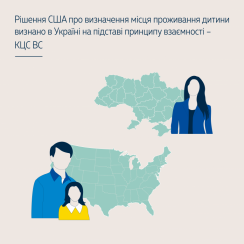Contact center of the Ukrainian Judiciary 044 207-35-46

The child's father asked the court to recognize and enforce the judgment of the Supreme Court of California. The judgment defines the United States as the child's place of residence and determines the residence of the child with the father, it also defines the conditions for visits by the mother of the child and establishes her right to travel with the child only with the written permission of the father, the other party or the court.
The court of first instance dismissed the claim, citing, inter alia, that it was during the debtor's (mother's) stay in Ukraine that she became aware of the court proceedings and the judgment of the Supreme Court of California, and the debt collector (father) and his representative did not provide evidence regarding the delivery of court documents to the debtor or evidence regarding her notification of the proceedings in the United States.
The court of appeal overturned the decision of the court of first instance, granted the claim in part, and recognized the judgment of the Supreme Court of California.
The Civil Cassation Court within the Supreme Court upheld the ruling of the court of appeal, drawing the following legal conclusions on the grounds of the provisions of international law and the Civil Procedural Code of Ukraine.
According to paragraph 10, part 1, Art. 1 of the Law of Ukraine On Private International Law, recognition of a decision of a foreign court is the extension of the legal force of a decision of a foreign court to the territory of Ukraine in the manner prescribed by law.
No international treaties have been concluded between Ukraine and the United States on legal assistance and legal relations in civil and family cases, so the recognition and enforcement of a foreign court decision depends on the principle of reciprocity (Article 462 of the Civil Procedural Code of Ukraine).
The specified provision corresponds to Art. 11 of the Law of Ukraine On Private International Law.
Thus, the principle of reciprocity consists in the fact that a state adhering to this principle grants similar rights on its territory and assumes similar obligations.
A national court may refuse to grant a request for permission to enforce a judgment of a foreign court, in particular, if the requesting party proves that it was deprived of the opportunity to participate in the legal process because it was not properly and timely notified about the trial.
"Notification about the process" should be understood as notification by the court of the parties of the place and time of trial, which will indicate an effective provision of the parties with the "right to trial".
At the same time, the debtor filed an application with the US court for claims in the case, and this indicates her being aware of the dispute. The notification of the mother is also stated in the court decision of the foreign court itself.
All the mail relating to the proceedings was sent to the debtor's address in the United States, as written by her in the procedural document.
It was ensured that the notice of court hearing was personally delivered to the debtor to the address specified by her, as well as temporary restraining orders and the right to visit the child and other documents.
It appears from the application filed by the debtor in the case that she is familiar with the subject matter of this case, in particular: the divorce procedure, custody and visitation of the child by one of the parents, child support, etc. After that, the debtor, being fully aware of the case, was not interested in the state of its proceedings and left the territory of the United States.
Thus, while being in the territory of Ukraine, the debtor was aware of the case being dealt with in the US court and restrictive orders against her, if she wanted to participate in the trial of the case, she should have informed the Supreme Court of California about her new address of residence and her stay in the territory of Ukraine. However, leaving the state in violation of the prohibitive restrictions and the failure to notify the Supreme Court of California of her intention to reside in Ukraine proves the debtor's reluctance to participate in the consideration of the said case.
In addition, the court of appeal, while resolving the case, reasonably considered that the judgment of the Supreme Court of California was not appealed by the debtor.
Resolution of the Supreme Court of July 27, 2022, in case No. 638/1720/20 (proceedings No. 61-2038св22) – https://reyestr.court.gov.ua/Review/105577974.
This and other legal positions of the Supreme Court can be found in the Database of Legal Positions of the Supreme Court - lpd.court.gov.ua/login.